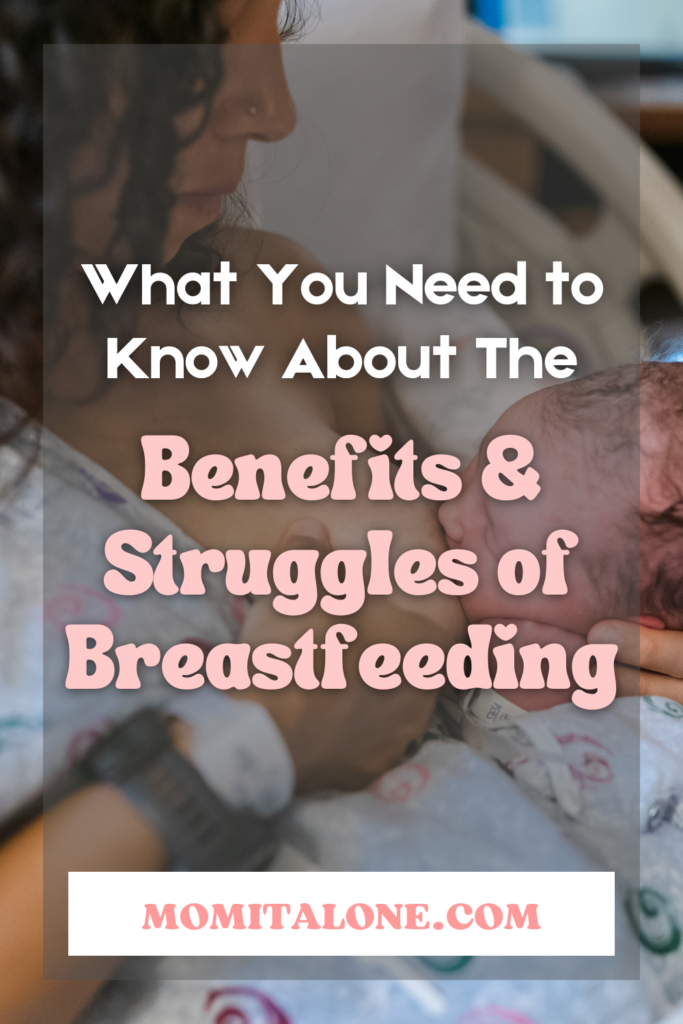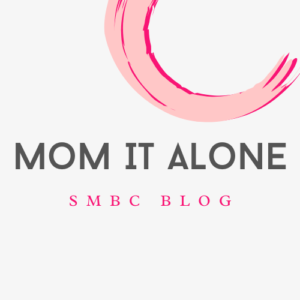What You Need To Know About The Benefits And Struggles Of Breastfeeding
This is a hot topic for moms. There are so many questions, concerns, and opinions around this subject.
Let me start by saying that choosing to breastfeed or not is entirely up to you and there is no wrong answer. There are several benefits to breastfeeding and I will go through these with you, but there are moms out there that are unable to breastfeed or may choose not to for their own personal reasons.
Whatever you choose is the right choice for you and do not let others shame you into making that decision for you.
So, let’s get into the nitty gritty of breastfeeding.

This post may contain affiliate links. That means if you click and buy, I may receive a small commission (at zero cost to you). Please see my full disclosure policy for details.
Disclaimer: I am not a medical professional. The information in this post is for informational purposes and does not constitute medical advice in any way. I am not liable for any damages resulting from using the information in this article. Please consult a doctor for your medical advice.
There are both benefits and struggles to breastfeeding. This isn’t a post to convince you to breastfeed your child or sugarcoat/gloss over the pain points of breastfeeding. I’m sharing what I’ve learned through my experience and what I’ve found is that breastfeeding is hard! It’s a job all in itself, it has its ups and downs, and I am very happy I battled my way through for as long as I did.
The Benefits
Super Beneficial For Baby & Mom
- Your baby gets so many of its needed nutrients from your breastmilk, especially the colostrum that you produce for the first few days after birth. This form of breastmilk is highly dense in nutrients, antibodies, and antioxidants that are so beneficial to your baby’s immune system.
- After those first few days, your regular breastmilk will come in. It is said that babies benefit from breastfeeding the most in the first six months. After that, you may decide to start introducing solid foods but can continue to breastfeed alongside these new foods.
- And for mom, it helps your uterus contract back to its normal size faster and potentially less bleeding after birth. It also may reduce mom’s risk of getting breast or ovarian cancer.
Bonding With Baby
- Breastfeeding is a great way for you and your baby to bond. You are still able to establish bonding with your baby if you choose to bottle feed or use formula, but the process of breastfeeding allows for more opportunities for skin-to-skin with your baby.
- As an added bonus, you produce oxytocin when you breastfeed, which improves your mood, allows you to feel a closer connection and bond with your baby, and provides a calming sensation.
Decreasing PPD Risk
- As mentioned in the point above, breastfeeding produces oxytocin, which may help to combat the rollercoaster your hormones are on that can cause you to feel sad or have a negative mood. From the research I’ve done (and I’ll include some resources for you at the end of this post) there have been studies to support this claim.
- More successes are seen in reducing PPD for breastfeeding moms who intended to breastfeed and went on to do so versus moms who intended to breastfeed and were unable to or moms who did not intend to but ended up breastfeeding. It is not clear if the latter was affected by the influence of society’s pressure and shame of choosing formula over breastfeeding (but I believe it’s implied). This is another reason to know that your choice is the right one for you and to stay true to what you believe is best for you.
Money Saver
- I don’t know if you’ve seen the formula prices lately, but they are kind of ridiculous, which puts another check into the benefits column for breastfeeding. If you are looking to save yourself some money, breastfeeding could help you with that.
Built-in Food Supply
- Along with the money-saving benefits, breastfeeding also serves as a built-in food supply for your baby. The only sustenance they need to survive on comes from your body, which is pretty amazing!
Decreases Risk of Diabetes
- I was diagnosed with Gestational Diabetes (GD) when I was in the third trimester of my pregnancy with my son. Having GD puts you at risk for developing Type 2 Diabetes later in life, which I was told can increase your chances up to 50%.
- I was also informed that breastfeeding helps to reduce this risk, along with maintaining a healthy diet and exercising.
Losing The “Baby” Weight
- Breastfeeding burns calories at an accelerated rate, which if you are maintaining a healthy, nutrient-rich diet, should help you to drop the “baby” weight more quickly.
- Friendly tip: try and stay away from the sweets. I wasn’t able to have them during my third trimester with GD, so I splurged a little bit after my bloodwork came back clear from GD after giving birth. In truth, I got a little too crazy with the donuts and pastries for a while, which did not help me burn off the weight and wasn’t a very healthy choice diet-wise.
The Struggles
Baby Having Trouble Latching
- Babies are instinctively programmed for breastfeeding but may have difficulty latching properly. After all, it is new to them and you and it can take practice to get it right.
- You will learn when they aren’t properly latched fairly quickly because when they are not, it will feel different and can actually be painful. It can also rub your nipple wrong causing discomfort.
- They may also be tongue-tied, which the breastfeeding specialist you meet while in the hospital should be able to tell if this is the case and counsel you on options for resolving this.
- It can be discouraging if you and baby continue having difficulties getting in the groove of breastfeeding. If your baby struggles to learn how to properly latch, it can decrease your milk supply, may cause you to have to supplement with formula, and can be emotionally and mentally taxing.
Nipple Soreness, Cracking & Clogged Milk Ducts
- Breastfeeding is new for your nipples as well and the exposure to your baby’s saliva and suction at such frequent intervals is sure to irritate them until they’ve grown accustomed to this oral assault.
- The discomfort of breastfeeding in the early stages can be frustrating, especially if you’re dealing with discomfort from cracked nipples. Be sure to use nipple cream/ointment every time after you nurse your baby to help keep them properly moisturized to avoid cracking.
- This was probably the worst part of breastfeeding for me. My nipples did crack in the first couple weeks, no bleeding thankfully, but there was plenty of discomfort. I get why moms sometimes decide to quit early on when they have nipple discomfort, nipple cracking, bleeding, clogged milk ducts, etc.
- I was one of the lucky ones that did not experience clogged milk ducts. From what I read, if you stay on a consistent breastfeeding schedule, this should make it easier to avoid getting a clogged duct, which can cause tender breasts and pain/discomfort.
- For clogged milk ducts: Breastfeeding is the best way to resolve a clogged milk duct. Try different positions and in between use cold compresses to help reduce swelling. Don’t stop breastfeeding, it will make it worse.
- For your nipples: I recommend this nipple cream that I used while I was breastfeeding my son. It’s organic, lanolin-free, safe for baby, and does a great job of keeping mom’s nipples moisturized between feeds.
Working Moms
- As a working mom, it can be difficult to keep up with a regular breastfeeding/pumping schedule, which helps to maintain your milk supply.
- Breastfeeding is the best way to signal your body to produce milk and maintain your supply, but pumping can help to mimic this and trick your body into producing milk at the same feeding times, so you don’t run the risk of depleting your supply.
- I work remotely from home and it was a little easier to be able to just breastfeed my son versus pumping, but I had to get creative with it, especially when I had meetings or things I needed to get done for work at the same time that he needed to nurse. I would turn off my camera for meetings, switch up the positions of breastfeeding to more easily use both of my hands to type, use my boba wrap, baby carrier, and boppy very strategically.
Milk Supply
- Maintaining your milk supply can be difficult, which can be very tough on your emotional and mental state. It can be affected by several different things:
- A change or interruption in the frequency of nursing/pumping
- Your diet
- Exercise
- Sickness
- The amount of water you drink
- Stress
- The amount of sleep you’re getting
- When I went back to work after my maternity leave, I noticed a drop in my milk supply. I’m guessing the switch up with our routine and shifting to a schedule with longer time frames between feedings had an effect on this.
- I started researching what I could do to boost my milk supply and began testing out different foods, recipes, and supplements, and increased my water intake to see what would work.
- It is a job in itself to not only produce milk but to maintain that milk supply as well. Remember to grant yourself some grace here. You’re doing a lot!
- *See the next section (Diet/Hydration) for tips on increasing your milk supply.
- Maintaining your milk supply can be difficult, which can be very tough on your emotional and mental state. It can be affected by several different things:
Breast Changes After Breastfeeding
- The dread of your breast changing after breastfeeding is a real concern. Your breasts expand to fill with milk and then have a tiny human draining them over and over again. Would you really expect them to look exactly the same as before you were pregnant?
- I’ve read about exercises you can do to help avoid the sagging of your breasts while breastfeeding, but I didn’t do a good job of implementing this into my routine. Thankfully my breasts didn’t sag too much after I was done breastfeeding.
- You can always try chest exercises to help fight the sag during and after the fact as well. And if that doesn’t work and you just can’t stand it, you can always save up your shekels and get a boob job. Lol. But seriously, you could.
Baby Teeth
- When your baby starts cutting their teeth, this can make breastfeeding a more painful task.
- When my son got his bottom two teeth I definitely noticed the difference when I was breastfeeding, but it didn’t hurt until he got teeth on the top as well and randomly would bite down on my nipple. OUCH! I didn’t last long after those top two teeth came in and my baby tried his hand at being a vampire.
- I’m not sure how moms can continue to breastfeed after that point. More power to them, I was out. I made it almost 9 months before I decided to call it quits.
Mom-Guilt When Stopping
- The mom-guilt is real. I knew once my baby started getting his teeth that I wouldn’t last long in continuing to breastfeed.
- I started introducing formula slowly around 6-7 months at bedtime feeding to help the transition and to help him sleep longer at night. I gradually increased the formula-to-breastmilk ratio a few weeks before I stopped nursing.
- I tried to maintain a pumping schedule but found it difficult to stay consistent once the formula feedings became more regular and let that wean off gradually as well. It was tough to make that call and I had some serious mom guilt about it.
- My short-term goal was to make it six months and my long-term goal was to make it to at least a year. I was a quarter shy of my long-term goal, but I’m proud to have made it as long as I did.

Diet/Hydration
Your diet and how hydrated you stay play a huge role in your milk supply. There are different foods that help to boost or increase your milk supply.
- Here are some of the foods that help boost milk supply:
- Flaxseed
- Oatmeal
- Avocado
- Bone Broth
- Fenugreek
- Coconut Oil
- Herbal Tea
- Nuts
- Garlic
- Brown Rice
- Salmon
- Sweet Potato
There are several other foods that can help to increase your milk supply and handy recipes for smoothies, meals, snacks, etc., that can all be found in my Breastfeeding Pinterest board.
Producing breast milk uses your body’s natural water supply, which is why it’s so important to stay hydrated. You’ll find yourself getting very thirsty while you breastfeed.
Be sure to keep a water bottle handy at all times. I suggest purchasing a big, insulated water bottle with a straw. That way it can hold a good amount of water and only takes one hand to drink from it (you’ll learn to do a lot if things one-handed).
This is the water bottle that I still use to this day. It holds 32oz, keeps your water cold, has a handle (super convenient for pack-mule-mom), a straw lid (convenient for one-handing it), is leak and spill-proof, stable-stay bottom, and is durable. I’ve dropped it several times. Lol.
Staying Consistent
In order to keep up your milk supply, the best rule of thumb is to try and stay as consistent as possible with your nursing/pumping schedule. When you do this, you are training your body to produce milk at the same times and in the same amounts.
Your body is responding to how often and how much it thinks your baby needs to eat, so the more often you nurse/pump, the more your body will produce if you are consistent. Take advantage of this during your maternity leave when you have the extra time and try to stock up on your freezer supply with extra pumping sessions.
Power Pumping
A helpful method to boost your milk supply if it’s dropped off a little is to do what is called “Power Pumping”. Essentially, you pump for an hour on and off.
You start by pumping for 20 minutes, rest for 10 minutes, pump again for 10 minutes, rest for 10 minutes, and then a final 10 minute pumping session.
It’s supposed to mimic cluster feeding (when your baby randomly feeds at more frequent intervals, which is more typical in the first few months). This tricks your body into thinking it needs to produce more milk to keep up with your baby’s needs.
Transitioning to Formula
When you do decide to switch your baby from breast milk to formula, try to do so gradually. This helps you and baby to make it a smoother transition.
Your baby’s digestive system will need to adjust and adapt to this new change. Expect for their bowel movements to change and they may have more gas build-up.
Making this change abruptly can be very jarring for them, which is why doing so gradually is best practice. If you need to make a quicker transition, try doing it in at least a week and gradually increase the breast milk to formula ratio every couple of days.
Your Choice
Remember that choosing how long to breastfeed, if you choose to breastfeed is up to you (unless you didn’t have a choice because you weren’t able to or decided it wasn’t what was right for you). You need to do what you feel is best for you and your child, and no one else can make that choice, except for you.
Below are some helpful articles/info on breastfeeding that I found worth reading:
The Role of Hormones in Lactation: What You Need to Know
Mothers Who Breastfeed Have Lower Risk of Postpartum Depression, Research Shows
FAQ on Breastfeeding Your Baby from The American College of Obstetrics and Gynecologists
Cheers, Warriors!
I hope you enjoyed reading this post and found it entertaining, educational, inspiring—hopefully, all three. Please be sure to leave any comments or questions you have in the Comments section below.
Don’t forget to sign up for my email list and claim your FREE template for Organizing Your Fertility Information that includes documents to track your appointment notes, fertility notes, financial planner, journal page, and more!

